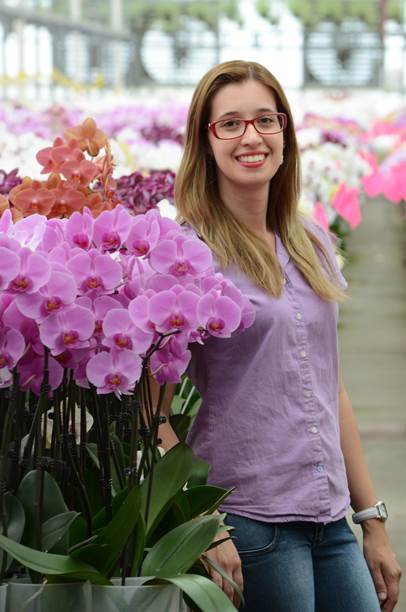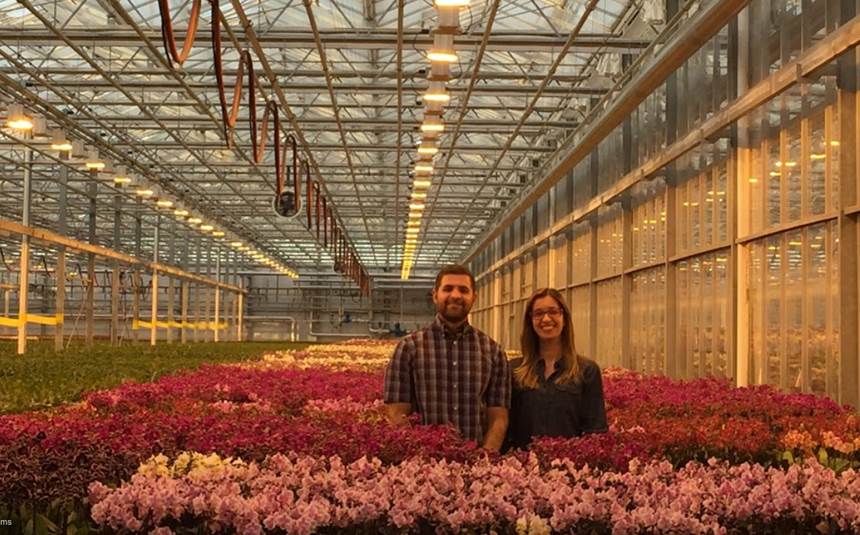
Danielle Ferriera, Plant Health Manager for the orchid range and the section grower for young plants at Green Circle, Ohio.
Green Circle Growers is one of the largest greenhouse operations in the Midwest. The operation is highly sophisticated and a leader with innovative new products and efficient and environmentally sustainable methods of production.
Danielle Ferriera, on growing orchids with water soluble fertilizer
Plant-Prod: Could you just take us through the process that you use to pick the correct water soluble fertilizer formulation and optimize the plant nutrition for growing orchids and young plants?
Danielle: Orchids use very little fertilizer. We basically feed a maximum of 1 EC (electrical conductivity) unit every time that we irrigate the plants. You have to be really careful because it’s so little, you really can cause problems if you’re not doing it correctly.
The first thing we do is listen and look to the plants. We have recipe guidelines but we fertilize according to what the plants are showing us. Maybe they’re growing too slow, maybe they’re growing too fast or they’re not as green as they should be or there are some yellow leaves on the bottom.
Then we look at our recipe and all the ratios of the nutrients. We have an Excel program where we see all the ratios. We actually work with micromoles and millimoles for our recipes. It’s a Dutch style apparently.
Plant-Prod: You work with Dutch consultants?
Danielle: Most are Dutch and they work with micromole. I usually work in micro propagation with micromole as well because you always mix so little. Obviously growing orchids in the MidWest is different from growing them in the Netherlands. Based on what the consultants tell us and based on what we’re seeing on the plants, we make the decisions. Do we need to add more calcium? Or more nitrogen? Basically we look at the plants and see what they are telling us.
We use rainwater and because it’s not pure, it has some nutrients already, we test it. We check that the recipe along with that source water has the final ratios we need.
Plant-Prod: How often do you test your plants water sources?
Danielle: We’re very careful with testing. We’re very blessed at Green Circle to have an in house lab so we can test the source water every week. We have several different recipes for all the different stages of growth for the orchids, each of which we test usually every other week.
Also, every single watering we check the EC for the mixture coming out of the boom and the drain water coming out of the pots.
We are very strict in our controls because like I said, orchids need very little EC, so you cannot give them too much, but you have got to give them the correct nutrients to maximize productivity.
Plant-Prod: How often do you do tissue essays?
Danielle: We do them every season to understand what happens year to year. Lately, we’ve been doing more and particularly when we have an issue, or we’re looking at the plants because they’re growing too fast or too slow. We then figure out what’s happening now compared to previous years where we have the seasonal data.
Plant-Prod: Your approach is very scientific, can you explain why?
Danielle: I have a Bachelor in Biology and a Masters degree in Botany. In my Masters degree, I specialized in tissue culture. I started working with nutrition because you need all the different nutrients to grow the plants in vitro. Tiny little changes have very different growth results. I could see the same thing with orchids, they use very little fertilizer but the balance makes a huge difference.
It is the same with commercial growing. If we don’t have a strong plant, we’re not going to be able to produce as many spikes as we’d like with as many flowers as we like. We need a strong plant, but also it cannot be too strong or you’re going to decrease the height of the plant and the number of flowers. You really have to have a healthy, strong plant that is the exact size with as many leaves as you need to go to the next step to produce as many spikes and flowers as we can.
Obviously climate control is very important as well. The two most important things are climate control and fertilizer.
Here’s the difference with orchids, they need very little water soluble fertilizer so a hobbyist who is growing them at home might say, “Oh yeah can just use a 2020 here or a 2814 here or there.” But to achieve the huge production we have, just for the orchids we have about 31 acres. It’s very important that everything is aligned the best way possible so we get the highest production with as many as two or three or four spikes with the right height and as many flowers per spike that we achieve.
Plant-Prod: What’s your experience with the Plant-Prod water soluble fertilizers? Have you used other brands over the years?
Danielle: We’ve been using Plant-Prod for a long time. We like them because the formulations are pure and complete. Really, whatever it tells you is in the bag is what you get when you’re mixing the fertilizer, which is very important so you know what you’re using.
Another thing is the really great experience I have had with the customer service. Anytime I have a question or I have a problem, or I need something, that maybe is not even completely related to just the fertilizer, Plant-Prod is right there to answer all the questions and help us understand what we need to do.

